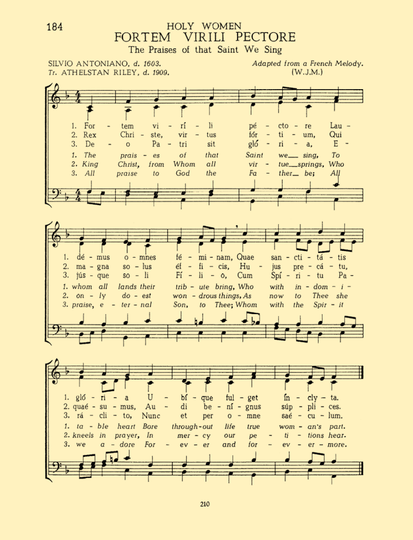 OR A LONG TIME, Catholic hymnals categorically refused to include translations by Protestants. The fear was that Protestant translators might taint or distort the theology contained in the ancient Catholic hymns—and in some cases this fear was justified. However, Fr. Adrian Fortescue disagreed, writing in 1913: “After Dr. Neale’s beautiful poetic translations of nearly all our hymns it seems vain for anyone else to try to rival them.”
OR A LONG TIME, Catholic hymnals categorically refused to include translations by Protestants. The fear was that Protestant translators might taint or distort the theology contained in the ancient Catholic hymns—and in some cases this fear was justified. However, Fr. Adrian Fortescue disagreed, writing in 1913: “After Dr. Neale’s beautiful poetic translations of nearly all our hymns it seems vain for anyone else to try to rival them.”
This prohibition—at least for American hymnals—seems to have softened in the 1950s. The Mediator Dei Hymnal (1955) contains many translations by non-Catholics, such as the following:

The New Saint Basil Hymnal (1958) also contains many translations by non-Catholics, such as this one by Athelstan Riley:

The Catholic Hymn Book (1998) by the London Oratory contains a translation by someone considered by many to be a “virulant anti-Catholic,” viz. Percy Dearmer:


FOR MYSELF, I HAVE NO ISSUE with English translations by Protestants, so long as theological truth is not damaged. Before agreeing to help with the St. Jean de Brébeuf Hymnal—which is turning out fantastic, by the way!—I made it clear that we should accept translations by non-Catholics if they are excellent and fully correct from a theological standpoint.
On the other hand, it is sad to see that John Henry Newman’s prediction has come to pass:
“Liberalism in religion is the doctrine that there is no positive truth in religion, but that one creed is as good as another… It teaches that all are to be tolerated, for all are matters of opinion. Revealed religion is not a truth, but a sentiment and a taste; not an objective fact, not miraculous; and it is the right of each individual to make it say just what strikes his fancy. […] Men may go to Protestant Churches and to Catholic, may get good from both and belong to neither.”
—Bl. John Henry Cardinal Newman (May of 1879)
To disguise the real differences between Catholics and Protestants, some now refer to “different traditions”—as if Catholics have one tradition and Baptists another. But JESUS CHRIST was quite clear about what happens to anyone who corrupts his teaching—so perhaps we should reflect carefully on that.
